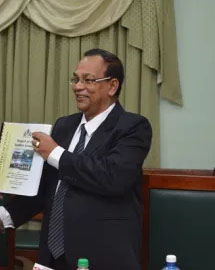The Audit Office is repeating a call for government agencies to move to paperless accounting as the COVID-19 pandemic made it impossible for it to complete the verification of projects in outlying Regions and at several ministry departments where staff rotation limited the scope of the audit.
“Now, more than ever the Audit Office has to rely on technology in performing audit procedures. This makes it more challenging, as we may not be able to physically observe all processes. The requirement to access everything remotely and electronically with limited IT capabilities affected both the Audit Office and its auditees,” Auditor General Deodat Sharma said in the 2019 Audit report which was laid in the National Assembly yesterday.
Sharma detailed how the pandemic and public health mitigation measures such as rotation of workers and travel restrictions affected access to Regions One, Seven, Eight, Nine and Ten preventing physical verification of projects and resulting in severe limitation in scope of the audits.
For those Ministries and Departments which could be accessed there continued to be limitations due to minimal staff on duty and the need to prioritize their restricted hours of work and limited physical interactions as mandated by the Government.
“This resulted in access to records and documents for audits being inadequate,” Sharma wrote.
He however noted that despite these challenges his Office was still able to complete a substantial amount of work in order to submit the report.
“As the COVID-19 pandemic continues, the Audit Office is facing new and unique challenges in performing audits. There has never been a time…when the need for Government to move from a manual system and paper-based payments to a computerized system and electronic payments [was more important] to auditors and Government alike,” the AG maintained.
He further noted that the response to the global pandemic and its associated economic impact, provides not only a challenge to Government to ensure a careful balance with accountability, transparency and integrity in their response mechanisms but an even greater challenge to the Audit Office to maintain public financial management discipline and address increased levels of waste and mismanagement when resources are under significant pressure.
Sharma said that this situation creates the need for specialized skills which the Office’s partnership with Global Affairs Canada and the Canadian Audit and Accountability Foundation can develop.
“Our enhanced training…will ensure that we play a key role in the different stages of this COVID-19 crisis. As the Government try to implement speedy responses to this crisis, no doubt crucial oversight and key controls will be compromised. As such, it is critical that the Audit Office is equipped to provide assurance on the use of funds and assess the economy, efficiency and effectiveness of the national responses,” he concluded.






